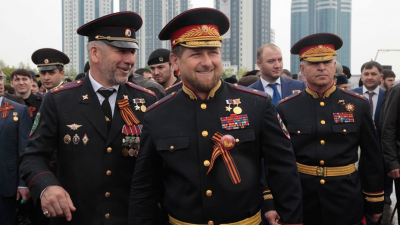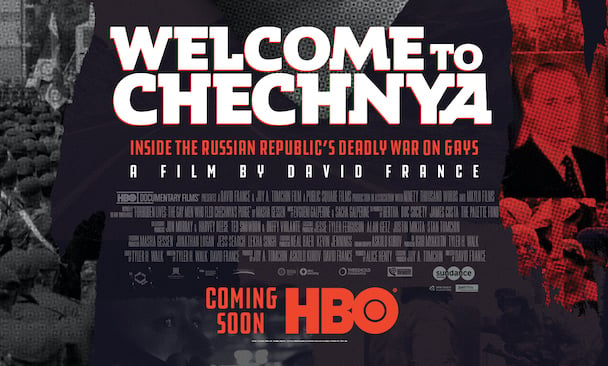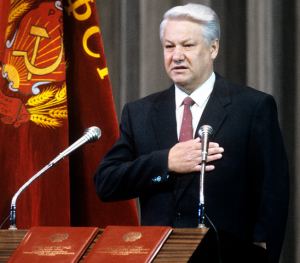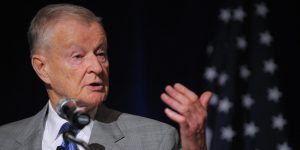HBO’s ‘Welcome to Chechnya’ Is Latest Anti-Russian Cold War Propaganda
Film Review: The selective outrage in response to the alleged purges, like all things Russia-related, is highly politicized. Western viewers would have no idea that of the 74 countries worldwide where homosexuality is still criminalized, Russia isn’t among them.

In 2017, explosive allegations first emerged that the authorities of the Chechen Republic were reportedly interning gay men in concentration camps. After a three year period of dormancy, the accusations have resurfaced in a new feature length documentary by HBO Films entitled Welcome to Chechnya. Shot between mid-2017 and early last year, the film has received widespread acclaim among Western media and film critics. Shortly after its release last month, the Trump administration and U.S. Secretary of State Mike Pompeo announced an increase in economic sanctions and imposed travel restrictions against Chechen leader Ramzan Kadyrov and his family, citing the putative human rights abuses in the southern Russian republic covered in the film.
Most of the boilerplate reviews of Welcome to Chechnya have heaped particular praise upon the documentary’s novelty use of ‘deepfake’ technology to hide the identities of alleged victims in the cinematic investigation. Yet at the closing of the film, one subject who previously appears with his likeness concealed by AI reveals himself at a news conference without the disguise—rendering the prior use of synthetic media fruitless. Maxim Lapunov, who is not even ethnically Chechen but a Russian native of Siberia, is still the only individual to have gone public with the charges. Despite the obvious credibility and authenticity questions regarding the use of such controversial technology, it has not prevented critics from lauding it unquestioningly. Unfortunately, even some in alternative media have been regurgitating the film’s propaganda such as The Intercept, a slick online news publication owned by billionaire eBay founder Pierre Omidyar whose financial ties to the national security state and U.S. soft power institutions conflict with the outlet’s purported mission. Notably, The Intercept’s glowing review of Welcome to Chechnyawas written by Mehdi Hasan, a journalist who also works for Al-Jazeera, a news agency owned by the ruling emirs of Qatar, a theocratic dictatorship where homosexuality is actually illegal.
The documentarians follow the work of a purported network of activists who evacuate individuals like Lapunov out of the Caucasian republic. This is the film’s primary source of drama, despite their encountering seemingly no difficulty from the local authorities in doing so. We are then subjected to random cell phone clips of apparent hate crimes and human rights abuses going on, but at no point does the film crew even visit the Argun prison where the anti-gay pogroms are alleged to have taken place. In 2017, the imperial hipsters at Vice news were given unrestricted access to the facility where nothing was found and the warden adamantly denied the allegations — but not without expressing his own disapproval of homosexuality which was assumed by his interrogators to be evidence of the detentions having occurred. In the HBO documentary, a similar hatchet job is done to Ramzan Kadyrov, whose uncomfortable denial of the existence of homosexuality in the deeply conservative and predominantly Muslim republic is implied to be proof that the purges must be happening. One may recall this same sort of smear tactic was previously done to former Iranian President Mahmoud Ahmadinejad. However, Kadyrov and the warden’s predictable responses to the subject serve only as confirmation bias, not confirmation.
The selective outrage in response to the alleged purges, like all things Russia-related, is highly politicized. Western viewers would have no idea that of the 74 countries worldwide where homosexuality is still criminalized, Russia isn’t among them. In more than a dozen of those nations, same-sex activity is punishable by death, a few of which happen to be close strategic allies of the United States, including Saudi Arabia and the United Arab Emirates. As recently as 2017, the U.S. was one of 13 countries to vote against a United Nations Human Rights Council resolution condemning countries with capital punishment for same-sex relations to avoid falling-out with those allies, most of which have legal systems established on their respective interpretations of Sharia law. While the local authorities of the Muslim-majority Chechen Republic have been allowed to introduce some elements of the fundamentalist religious code by the Russian government such as the banning of alcohol and gambling and requiring the wearing of hijab by women, as a federal subject it is still ultimately beholden to Russia’s secular constitution. In fact, it was Kadyrov’s predecessor, Alu Alkhanov, who hoped to govern Chechnya with Sharia law, not the current administration. Credulous audiences would have no clue that Kadyrov actually represents the more moderate wing of Chechen politics because there is absolutely no history or context provided, a deliberately misleading choice on the part of the filmmakers.
The absence of any historical background deceptively suggests that the anti-gay sentiment in the mostly Muslim North Caucasus is somehow an extension of the homophobia in Russia itself, despite the autonomous differences in religion, culture, and society. In the last decade, the weaponization of identity politics has been central to Washington’s ongoing demonization of Russia and its President, Vladimir Putin, with the issue of LGBT rights particularly given significant attention. While homosexuality is decriminalized, there is admittedly no legal prohibition of discrimination against the LGBT community in Russia. In particular, human rights groups have condemned the notorious federal law passed in 2013 known as the ‘gay propaganda law’ that forbids the distribution of information promoting “non-traditional sexual relations” to minors, which entails the banning of gay pride parades and other LGBT rights demonstrations. However, the measure enjoys widespread support among the Russian people whose social conservatism has been resuscitated by the Orthodox Church since the breakup of the Soviet Union. It is rather ironic and hypocritical that the West has since taken issue with this turn, considering it facilitated that political transformation.
In reality, the reason for the relentless vilification of Putin has absolutely nothing to to do with the exaggerated plight of gays in Russia and a lot more to do with the reversal of policies under his predecessor, Boris Yeltsin (image on the right). In the nineties, the mass privatization of the former state-owned enterprises during Russia’s conversion to capitalism resulted in the instant impoverishment of millions and the rapid rise of the notorious ‘oligarchs’ which the West characterized at the time as progression towards democracy. In the loans-for-shares scheme, a new ruling class of bankers and industrialists accumulated enormous wealth overnight and by the middle of the decade, owned or controlled much of the country’s media outlets. The oligarchs held enormous power and influence over the deeply unpopular Yeltsin, who would surely have lost reelection in 1996 without their backing and the assistance of Western meddling in the form of massive loans from the International Monetary Fund (IMF).
While economic disparity and corruption persists today, overall the Russian economy has been rebuilt after its energy assets were re-nationalized and brought back under state control by the Putin administration, resulting in improved living standards and income levels for the last two decades. By the same measure, the Russian people can hardly be blamed for associating homosexuality with the unbridled neoliberalism, vulture capitalism and draconian austerity imposed on their country by Western capital. It is also truly paradoxical that the notion of “Russian oligarchs” has become synonymous with Putin in the minds of Westerners when many of the most obscenely wealthy oligarchs of the Yeltsin era now live in exile as his most ardent political opponents after they faced prosecution for their financial crimes. Not coincidentally, the initial reports of the ‘gay gulags’ in Chechnya were published in Novaya Gazeta, an anti-Putin newspaper partly owned by former Soviet President Mikhail Gorbachev, the very man who ushered in the economic liberalization which auctioned off the state assets to oligarchs like co-owner Alexander Lebedev.
Gorbachev’s reforms, particularly that of perestroika (“restructuring”), also had destructive consequences for the national question and ethno-regional interests. V.I. Lenin had famously called the Russian Empire a “prison house of nations”, in reference to its heterogeneous range of nationalities and ethnic groups. The dissolution of the Soviet Union in 1991 especially re-agitated ethno-national conflicts in the Caucasus, a region that had enjoyed several decades of relative harmony and stability under socialism with rights and representation that did not exist in pre-revolutionary Russia. While Azerbaijan and Georgia were granted independence, Chechnya and many other municipalities remained under federal control of the Russian Federation, as sovereignty did not constitutionally apply because it had never been an independent state. Not to mention, its oil and gas reserves are essential to Russia’s very economic survival.
The jihadism which plagued the Caucasus was an outgrowth of the U.S.-backed ‘holy war’ in Afghanistan in the 1980s, the brainchild of Zbigniew Brzezinski, National Security Advisor in the Jimmy Carter administration. It was the Polish-born Brzezinski who not only authored the geostrategy of arming the mujahideen against the Soviets but the efforts to turn Russia’s own large Muslim minority community against them. This was mostly unsuccessful as the majority of its 20 million Muslims (10% of the population) are harmoniously integrated into Russian society, but the Atlanticists did fan the flames of a militant secessionist movement in Chechnya that erupted in a violent insurgency and became increasingly Islamist as the conflict dragged on. For Washington, the hope was that the West could gain access to Caspian oil by encouraging the al-Qaeda-linked separatists rebranded as “rebels” vulnerable to its domination in the energy-rich region. The collapse of the USSR already escalated hostilities between the intermingling ethnic communities of the region, but the antagonisms were intensified by CIA soft power cutouts like the Jamestown Foundation fomenting the secessionist insurrection. As the separatist movement grew increasingly Wahhabist thanks to U.S.-ally Saudi Arabia, its more moderate nationalist faction led by Akhmad Kadyrov eventually defected back to the Russian side. The elder Kadyrov would pay the price when he was assassinated in a 2004 stadium bombing in Grozny during an annual Victory Day celebration, with his son becoming one of his successors.
The Kremlin’s support for the Kadyrovs should be understood as a compromise which prevented the more radical Islamists from taking power, which apparently Washington would be happier with running the North Caucasus. What a human rights utopia Chechnya would be as a breakaway Islamic state, under the salafists which during the Chechen wars committed unspeakable acts of terrorism including the taking of hospital patients, theater goers, and even hundreds of schoolchildren as hostages. One can be certain that if there aren’t anti-gay pogroms going on in Chechnya now, there definitely would be without the likes of Kadyrov in power. In the documentary, what the Chechen leader does implicitly acknowledge may be occurring are individual honor killings within families and clans, a social problem common in other Muslim countries such as Pakistan, and certainly not a human rights issue particular to Chechnya. Many instances of honor killings in the Muslim world have included homosexuality as a motive for the extrajudicial killings by relatives of victims believed to have betrayed the family honor. On the other hand, Kadyrov himself has overseen the establishment of unprecedented reconciliation commissions to address the issue of honor culture, blood feuds and vendetta codes of Caucasian tribes. Kadyrov’s promotion of reconciliation has made significant progress in reducing such killings which were rampant during the Chechen Wars as family members would often seek to avenge the deaths of loved ones. Now that the region is in a period of relative stability, peace and economic recovery, with the once devastated city of Grozny now known as the ‘Dubai of the North Caucasus’, the West is suddenly feigning concern over human rights.
The swift end brought to the conflict by Putin was another reason for his becoming a target of Washington who had been counting on the balkanization of southern Russia. In a pinnacle of imperial projection, the explanation for Putin’s rise to power has since been revised by the Atlanticists to his having somehow secretly masterminded the 1999 Moscow apartment bombings while director of the Federal Security Service (FSB, the KGB’s successor), as if the neocons hope to deflect all of the longstanding rumors about the Bush administration and the 9/11 attacks onto the Kremlin. Except this Machiavellian conspiracy would be a lot more believable if the Chechen wars had not been going on since the early nineties, with much worse terrorist attacks already having been committed by the separatists, such as the taking of thousands of hospital patients as hostages in southern Russia. Since the end of the Chechen Wars, on the flip side the U.S. has also backed Russian opposition figure and Putin critic Alexei Navalny, a right-wing Islamophobe who has pledged to secede the North Caucasus while comparing its Muslim inhabitants to cockroaches. Despite his anti-immigrant rhetoric and minuscule 2% support among Russians, Navalny has been depicted as a “pro-democracy” and “anti-corruption” campaigner in Western media, who have been crying foul over his recent suspected poisoning in Russia and ensuing comatose airlift to Germany. If only the naive American liberals who read The New York Timesand The Washington Post had any idea that Mr. Navalny has far more in common with the dreaded Mr. Trump than Putin does.
Meanwhile, the U.S. has already experienced blowback for its nurturing of terrorism in the Caucasus in the form of the Boston Marathon bombings, which recently returned to the news when convicted Chechen-American perpetrator Dzokhar Tsarnaev’s death sentence was vacated on appeal last month. In the aftermath of the April 2013 attacks, it was revealed that Tsarnaev’s deceased older brother and co-conspirator Tamerlan Tsarnaev had been radicalized attending seminars financed by the Jamestown Foundation while traveling abroad in Tblisi, Georgia, and the brothers’ uncle Ruslan Tsarni had previously been married to the daughter of high-ranking U.S. intelligence officer Graham Fuller, Brzezinski’s CIA station chief in Kabul, Afghanistan, during the Afghan-Soviet war. It also came to light that ‘Uncle Ruslan’ had previously worked for the CIA-linked United States Agency for International Development (USAID) and established a company called the Congress for Chechen International Organizations which funded Islamic militants in the Caucasus. Despite the astounding ‘coincidences’ surrounding the Tsarnaev clan, Uncle Ruslan was never considered a person of interest by the FBI, who had ignored warnings by the Russian FSB of Tamerlan Tsarnaev’s extremism prior to the attacks.
Two years before Putin’s election, Zbigniew Brzezinski, the prime mover of the West‘s plan to dominate the globe by using Islam to bring down the USSR in delivering the Soviet equivalent of the Vietnam War, wrote in The Grand Chessboard: American Primacy and Its Geostrategic Imperatives (1997):
“…The last decade of the twentieth century has witnessed a tectonic shift in world affairs. For the first time ever, a non-Eurasian power has emerged not only as a key arbiter of Eurasian power relations but also as the world’s paramount power. The defeat and collapse of the Soviet Union was the final step in the rapid ascendance of a Western Hemisphere power, the United States, as the sole and, indeed, the first truly global power.”
Those words were written before the return of both Russia and China on the world stage, developments that have thrown a monkey wrench into Washington’s plans which the Russophobic Warsaw-native did not anticipate in his blueprint for Western hegemony. When the U.S.-backed headchoppers in the Syrian war nearly had control of Damascus, just a thousand miles or so from Sochi, the threat of jihadism returning to the Caucasus became very real. Beginning at the Munich Conference in 2007, Putin had begun to criticize the monopolistic expansion of NATO on Russia’s borders — but after the subsequent overthrow of Muammar Gaddafi where Moscow witnessed Libya transformed into a hotbed of terrorism like post-Saddam Iraq, the prospect of the same happening in Syria was an existential threat that could not be tolerated. In mainstream media, reality has been inverted where Moscow’s self-defense has been portrayed as expansionism, even though the so-called “annexation” of Crimea was virtually nonviolent compared to the Nazi junta initiated by Washington in Ukraine and the Russian-speaking people of Donetsk and Luhansk who voted to join Russia did not wish to end up like those massacred in Odessa. Besides, is the U.S. not currently annexing northeast Syria? The Crimean parliament and Syrian government invited Moscow, while the same cannot be said for the US presence in violation of international law.
Those with no respect for the sovereignty of nations in Washington would prefer Americans to see Russia as an adversary. During the Cold War, the threat was communism, but with capitalism restored in Eastern Europe, it became necessary to manipulate liberals into perceiving Russia as a ultra conservative regime. They must also keep Americans from knowing the true history of US-Russia relations — that Russia was the first nation to recognize American independence when Catherine the Great’s neutrality during the Revolutionary War indirectly aided the Thirteen Colonies in their victory against the Loyalists and Great Britain. During the War of Independence, the Russian Empress had maintained relations with the U.S. and rebuffed British requests for military assistance.
The Russian Empire also later helped secure the Union victory during the Civil War, with an Imperial Navy fleet off the shores of the Pacific preventing the Confederates from landing troops on the west coast and deterring intervention by the British and the French. Then as Allies in WWII, while the U.S. was victorious in the Pacific, it was the Soviets who truly won the war in Europe, a feat the Anglo-Americans are still trying to take credit for to this day. Unfortunately, despite his promising rhetorical embrace of détente with Moscow that has made him the subject of political persecution, Donald Trump has proven to be every bit as hostile toward Russia as his forerunners. With the latest actions taken by his state department regarding Chechnya that are right out of the Brzezinski playbook, the idiom that “the more things change, the more they stay the same” certainly applies to Washington and US-Russia relations.
*
Note to readers: please click the share buttons above or below. Forward this article to your email lists. Crosspost on your blog site, internet forums. etc.
Max Parry is an independent journalist and geopolitical analyst. His writing has appeared widely in alternative media. Max may be reached at [email protected]. He is frequent contributor to Global Research




